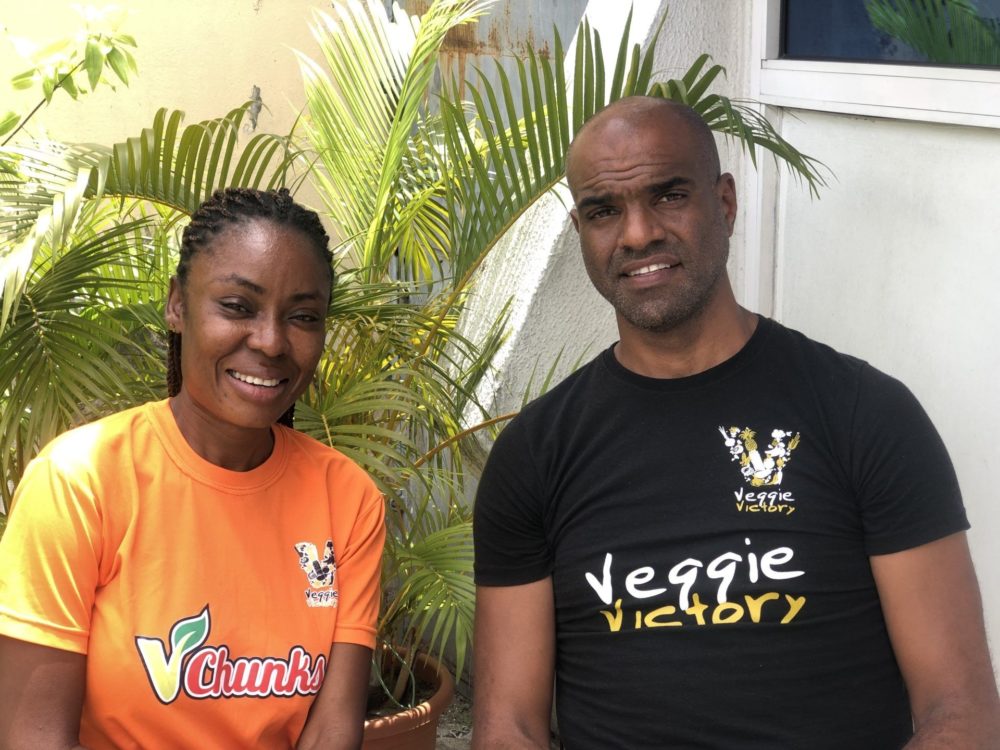Disclosure: The GROW Impact Accelerator is backed by AgFunder, AFN’s parent company.
Africa’s population is predicted to double from 1.3 billion to 2.5 billion by 2050 – the year by which we’re supposed to have limited global heating to 1.5 degrees Celsius above pre-industrial norms. That’s an extra billion-plus mouths to feed on a continent that already falls short when it comes to providing its population with enough protein – and all while reducing greenhouse gas emissions.
Nigeria’s Veggie Victory is working to solve the shortfall sustainably by developing plant-based protein products — including its flagship offering VChunks — that can seamlessly substitute animal-derived meat in local dishes.
The startup recently joined AgFunder and GROW‘s latest Impact Accelerator cohort, and AFN caught up with co-founder and CEO Hakeem Jimo (HJ) to find out more about its plans to plug Africa’s protein gap.
AFN: What problem is Veggie Victory trying to solve, and how does your technology offer a solution?
HJ: My vegan journey started 27 years ago in Germany. I grew up in Germany, and moved to West Africa 20 years ago. When I got to Nigeria, I realised there were even less vegan and vegetarian options than back in Europe at that time.
In 2013, we started Veggie Victory as a vegan restaurant – the first of its kind in Lagos. We quickly noticed the interest of lots of people [but many] couldn’t make it to the restaurant. So we thought, “How can we get this food to you?” Also, finding products for the restaurant was difficult.
That’s when we developed VChunks. It took a few years to get the certification and get the formula right. Our other founder Bola [Adeyanju] heads up product development, and she was really the brains behind that. She knows local tastes down to a scratch.
AFN: What gives Veggie Victory its competitive edge and differentiates it from others trying to solve the same problem?
HJ: One of the key features is that it is a dried, dehydrated product. Think of [dried] pasta: you don’t need a fridge; which is super-critical on this continent. So there’s no need for a cold chain; people mostly still buy food from traditional, open markets, and supermarkets account for only around 5% of the food supply.
And, what we always say is that plant-based meat substitutes need local champions. It doesn’t make sense to have one burger company from the US supplying the whole world. Other regions have different kinds of tastes; and I even generalize about Africa, but we want more chunky meat. We’re not so crazy about minced meat or burgers. What we want is our stews, and you have chunks floating in there, and that is exactly how a lot of Africans eat meat. VChunks really has that texture that Africans expect of meat: it’s more chewy, it’s more of a whole cut, and it’s something you really chew on in one piece – not in a processed way. Texture: that’s really our secret sauce.
AFN: What is the biggest challenge Veggie Victory is facing at the moment?
HJ: Looking for strategic partners: distributors, retailers, country agents. Distribution in Africa is super-difficult. We can’t reinvent the wheel, and every African country is so different, each with a different regulatory environment. That is really our main constraint. We need local people who know their market.
And it’s not only about Africa, but also African expats and diaspora communities. That’s also a way of connecting to people. The UK, for example, has millions of Nigerians and people of Nigerian descent, and they really want products that are speaking to them and their heritage [and] at the same time they want healthy products. Again, even there, we need more distributors and partners.
AFN: What does ‘impact’ mean to you personally, and to Veggie Victory as a business? Why is environmental and social impact so important?
HJ: I’ve been vegan for 23 years, opened the restaurant, so we’re really mission-driven from the founder side.
We believe Africa needs other sources of protein because of the severe protein deficiency we have on the continent. We only consume half of what Asians are consuming, and a fraction of what Americans are eating; so we need to fix the protein deficiency, and we believe it cannot be done with animal protein only. It needs to be a mix. Plant-based is an affordable way to do that.
But already, the livestock industry is not able to supply all the needed protein, which leads to all kinds of human development problems. [By now] also it’s common sense that livestock production is harmful for sustainability, including in terms of water resources – that’s a big issue in Africa even more than in Europe – greenhouse gas emissions, and land erosion.
We provide a solution for people to eat more plant-based alternatives, because people like meat: we are not blind to that.





